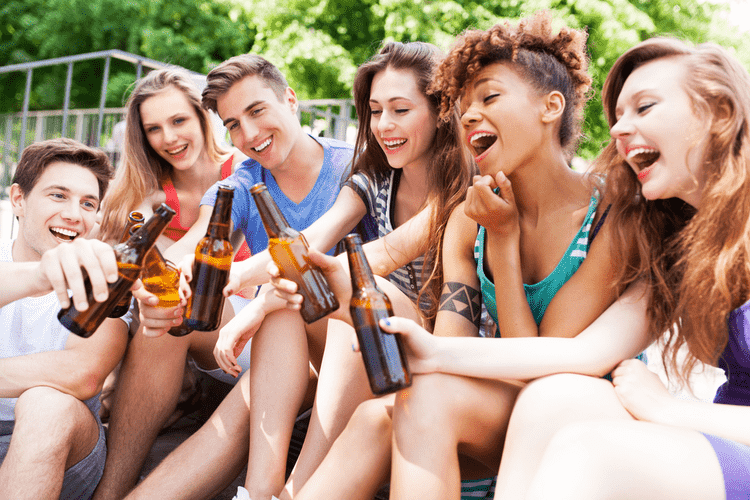In fact, alcohol may actually cause more anxiety the day after. When it comes to alcohol, the line between fiction and fact is often blurry. Whether it’s at a party with friends or through pop culture references, there are quite a few things about drinking alcohol that get misconstrued. What we’ve Top 5 Advantages of Staying in a Sober Living House found in animal models of binge drinking is that certain subtypes of neurons lose the ability to talk to each other appropriately. In some cases, binge drinking can permanently remodel the brain. Even after a prolonged period of abstinence, conversations between the neurons don’t return to normal.
Reinforcement and New Associations: How Alcohol’s Appeal Grows

Experts on the subject have identified alcohol as a depressant drug that can create the effect of anxiety and depression as a result of drinking too much, or drinking too fast. For those who already have clinical anxiety or depression, alcohol can worsen the symptoms of both conditions. You may think that you’re sober once you’re able to walk in a straight line, but that doesn’t mean that you aren’t drunk.
Thinking of Stopping Drinking? 9 Tips to Succeed
More than half (nearly 52 percent) of our survey participants revealed that they’d had depressing thoughts while drinking alcohol. People who drink excessively may be more prone to these mental effects than those who adhere to the low-risk standards set by the National Institute on Alcohol Abuse and Alcoholism (NIAAA). Having food in your stomach slows absorption, while drinking on an empty stomach has the opposite effect. The faster alcohol is absorbed into your bloodstream, the higher your BAC, and the longer it’ll take to sober up — especially if you keep drinking.
- My husband and I had moved away from everything we knew, so I was trying to make new friends and raise my baby all while handling a new job.
- If one eats before they drink, the food will slow down the absorption of alcohol into the bloodstream.
- You might feel drunk right after you wake up as opposed to the auto-brewery syndrome.
- For example, people who are very drunk might underestimate how intoxicated they are.
How does alcohol cause intoxication?
The duration of intoxication depends on how much alcohol an individual consumes. Typically, it can take at least several hours for their BAC to reduce enough for it to be safe to drive. This article examines the effects of alcohol, their duration, and whether individuals can hasten the sobering process. According to the 2015 National Survey on Drug Use and Health, 70.1% of adults in the United States report drinking alcohol during the past year.
These people have a higher risk of having auto-brewery syndrome. In auto-brewery syndrome, your body automatically ‘brews’ carbohydrates into ethanol or alcohol. Too much yeast inside your intestines or stomach https://thebostondigest.com/top-5-advantages-of-staying-in-a-sober-living-house/ may lead to this condition. Both children and adults may have the auto-brewery syndrome. In addition, some medications can ramp up the effect of alcohol and cause you to feel tipsier than you otherwise would.
- If you want to have more control over your alcohol use and its effects on your emotions, be sure to limit your drinking and avoid becoming intoxicated.
- And, if you look at the section where she pretends to chug from her drink, most of the drink can be seen falling out of her mouth and running down her chin.
- The body is capable of healing in incredible ways, and many of these long-term effects can be prevented or minimized by cutting back or cutting out alcohol.
- Outside of the nervous system, alcohol can permanently damage the liver and result in liver cirrhosis.
The 9 Stages of Drinking
- For example, if you’re experiencing high levels of stress, your body may absorb alcohol more quickly and heighten the existing stress levels.
- Drinking can lower inhibitions because it releases dopamine, a chemical which makes you feel happier.
- However, you can try getting a good night’s sleep every night.
- But as you continue to drink, you become drowsy and have less control over your actions.
- We focus on bringing you all things fun so you can plan your theme park vacation, enjoy Disney at home, and more.
- This pivotal moment was the beginning of my journey to understanding the deeper reasons behind alcohol consumption, a journey I now navigate with my clients.
- This tipsiness begins when alcohol enters the body’s bloodstream and starts to affect the functions of the brain and body.
The small intestine is another place where alcohol enters your bloodstream, because of all the blood vessels there. How much of the alcohol enters here versus how much enters through your stomach will depend on a variety of factors, such as how full your stomach is. The interaction between alcohol and the small intestine can lead to various gut-health issues, such as inflammation and an overgrowth of ‘bad bacteria’. There are numerous possible short-term effects of drinking alcohol, many of which depend on the amount of alcohol consumed.
Alcohol forces our bodies to create an increased amount of serotonin and endorphins, which are responsible for regulating our emotions and our sense of relaxation and happiness. Ultimately, the more often you drink, the more vulnerable your brain becomes to the effects of alcohol, potentially making your moods more volatile over time. Genetic, psychological, social and environmental factors can impact how drinking alcohol affects your body and behavior. Theories suggest that for certain people drinking has a different and stronger impact that can lead to alcohol use disorder.